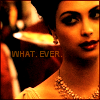
I am in the process of taking a much needed mental break in the midst of lots and lots of editing. Having a fantastic time, really, but because I don’t have anything “big” that’ll be released until next year, I thought it was a good time to revisit my goals and topics related to my career. One of them is about marketing and promoting both myself and my work.
So here’s the part where I get all real and gritty with you. I hate telling you all the reasons why I’m awesome and why you should invest in any project I’ve been a part of, simply because “I” did it. I would much, much, much rather show you why you might be interested, than command you to buy my books. This, I feel, is an important distinction because it really comes down to a matter of trust for me. You are the reader, and you are the reason why I’m writing. (Doubly so if you’re a fan of a license I’m working on!) Thus, I feel it’s my job to pour every ounce of passion that I have, that excitement I don’t know how to shut off, into everything I do because I feel I need to earn your dollars and your support. I’m guessing this partly comes from the way I buy books. I’m not someone who has ever bought a book because it’s popular. I might get a book from the library, mind you, but when it comes to dollar signs I feel that every one of them is a vote. I feel that every time you star a book or review it or talk about it or recommend it — that’s another way to vote.
The lessons I learned this year, however, forced me to rethink this philosophy. (Or, I should say… This is what I’m currently going with.) I cannot ensure that every person who comments actually reads the entire contents of the books I work on, nor will I make every fan happy. I found that obsessing about the comments and reviews is a path to madness and procrastination. That way is shut. It was also not easy for me to realize that often, fandom isn’t related to the specific details of things like which character wore what and when. It’s about the emotional connection to the story, the characters, and who you/me were at the time. Sometimes, fans are reacting to an actor who was in the movie, or the angst toward what a director did, and that’s got nothing to do with the nuts and bolts of how a project is put together. Often, however, authors don’t have control over every step in the process for the production of a book, comic, or game. I do my part, and then I watch it fly away into the ether, until it becomes a real live book–and fans don’t necessarily care about logistics, because reminding people that the production of any show, book, game, etc. has business mechanisms in place robs those beautiful things of their glamour. This did break my heart a little bit, because I’ve always been a DIY’er to varying degrees. Yes, now I know that there are fans who may have loved something I did, but will never get around to connecting with me or writing reviews. Now I do!
I would love/kill/sacrifice my mac-and-cheese addiction for the illusion of control over what happens after a book is released. The brutal honest truth is that I have none. Yes, marketing can help boost visibility and get people interested in a book. Certainly, self-promotion can benefit this, too. That? That I can control. How then, do I talk about me being “me” without wandering around dazed and confused even though there are no mind-altering substances in my system? Or, to put it another way, how do I talk about me being “me”, other than what I’ve already been doing to encourage you to check out my work?
Oh, I’ve heard the mantras. Fortune favors the bold. Fake it until you become it. I’m going to let you in on a not-so-big secret. I suck at being fake, and I have my own way of doing things. You took the stickers off your Rubik’s Cube? I had a screwdriver, took it apart, and reassembled it. The need for me to “pretend” has gone the way of the stegosaurus, unless I am specifically tying an appearance to a performance on stage or at a con. It is boring, uninteresting, and a waste of my time (and yours) to pretend to be one person in this one instance and another somewhere else. I can be polite and professional, but the vast majority of the time? I’m just me with all my quirks and oddities.
Okay, applying this to Firefly… I am scared to death of being funny when talking about The Gorramn Shiniest Language Guide and Phrasebook in the ‘Verse. My normal state is sarcastic, mind you, and this setting is a breeze to write for because of that. Why, if someone were to invite me to write for the comic, I’d… Yeah, okay. Not going there. Anyway! Sometimes My Big Fat MouthTM likes to crack a joke before my brain has the opportunity to catch up. I’m not even kidding. Offensive? Um… There’s been a few instances where I may have potentially said the wrong thing at the worst possible time…
You get the picture.
Here, though, I feel that being funny about the language used in the show is both inappropriate and disrespectful to Joss Whedon and his team, Fox, and my publisher. My role as a language analyst is after the completion of the work, and I felt that this meant I had a responsibility to look as deep as I could into the subject matter. I feel that if I’m being a smart ass, I’m sending a message to you that I didn’t take this project seriously — and I can assure you that is most definitely not the case. It’s the exact opposite, in fact, and I can guarantee that my editor feels the same way about her contribution. This, too, is me being me. It’s just a serious flavor of what I have to offer you as a writer. Even though I am thrilled to be a part of this setting again, I don’t want to F-bomb it up. I love Firefly. Always have. I am proud to be a part of the ‘Verse, and it is my wish that you’ll take a chance on this book when it was released because of that, too.
I better end this post today before I wax even more philosophical. I really don’t know if I’ll ever figure out this self-promotion thing, and I have no clue how to even go about asking you to help me boost the signal. I’ve been doing that, it just hasn’t been consistent and pushy, ’cause that’s annoying. Still, I often feel like my time is better spent writing All The ThingsTM than talking about writing them, but I know that’s not always a good approach. I guess only time will tell.
- Mood: I’m having a bad hair day. Ergo, crabby.
Caffeinated Beverages Consumed: Um… Yeah, well ixnay on the okecay erozay?
Work-Out Minutes Logged Yesterday: HAH HAH HAH
In My Ears: That would be Pandora, of the Nightmare Before Christmas variety.
Game Last Played: Diablo III
Book Last Read: SON OF A… I forgot the title. Again.
Movie/TV Show Last Viewed: Once Upon a Time
Latest Artistic Project: Can’t think. Editing.
Latest Fiction/Comic Release: Gods, Memes, and Monsters
Latest Game Release: Dread Names, Red List for Vampire: the Masquerade and Ghosts in the Black for the Firefly RPG.
Current State of Projects: Read my latest project update and My Departure from the Conan RPG.

